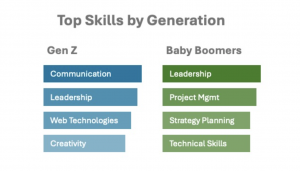Rhetorik Unveils Landmark Workforce Analysis: Gen Z is Reshaping the Global Workplace
New global data reveals Gen Z's shift toward purpose-driven, collaborative, and tech-centric careers - redefining traditional paths to success
Rather than climbing the corporate ladder, Gen Z professionals are opting for careers that align with personal values, flexibility, and impact. Roles in digital marketing, software development, design, and content creation are seeing disproportionate representation from this cohort. Meanwhile, more traditional paths such as law and general management are seeing a marked decline in Gen Z interest.
Soft Skills Meet Tech Fluency
Among the most cited skills in Gen Z profiles is communication, highlighting the rising value of soft skills alongside technical proficiency. Other top skills include coding, teamwork, design thinking, and AI literacy, underscoring the generation’s adaptability and collaborative orientation.
A Data-Driven View of Global Workforce Trends
Unlike traditional surveys, Rhetorik’s Neuron 360 uses machine learning to analyse real, behavioural career data, capturing inferred age, gender, skill sets, and job roles across 800+ million profiles. This granular, scalable insight provides a high-resolution view of global talent trends across sectors and geographies.
“As data scientists, we thrive on working with datasets that act like lenses into the labour market, where the right question can reveal anything from gender patterns in specialised roles to skill shifts across generations,” said Matthieu Perrodin, Data Scientist at Rhetorik.
Generational Contrasts Across the Board
The analysis underscores stark differences between generations:
- Baby Boomers (61–79) dominate leadership and negotiation-heavy roles.
- Gen X (45–60) bridges traditional management with digital fluency.
- Millennials (29–44) show a hybrid skill set embracing both legacy tools and emerging technologies.
- Gen Z (13–28) stands apart — driven by identity, autonomy, and impact, not hierarchy.
In healthcare, for example, gender dynamics are shifting. More women are entering specialised medical fields, while caregiving and nursing are seeing a rise in male participation — highlighting a move toward more inclusive, emotionally intelligent workplace norms.
Implications for Employers, Educators, and Policymakers
The findings carry major implications for workforce strategy. Legacy frameworks for leadership, advancement, and professional development are being upended. Organisations will need to pivot toward flexible, purpose-led talent models that reflect the values and priorities of a new generation.
The future of work is not on the horizon — it’s already unfolding, shaped by a generation that values purpose over hierarchy, adaptability over tradition, and multidimensional success over linear progression.
To access the full analysis and visual breakdowns, click here.
Francesca Tuohy-Farmer
Rhetorik Ltd
email us here
Legal Disclaimer:
EIN Presswire provides this news content "as is" without warranty of any kind. We do not accept any responsibility or liability for the accuracy, content, images, videos, licenses, completeness, legality, or reliability of the information contained in this article. If you have any complaints or copyright issues related to this article, kindly contact the author above.
Realty Photos Expands Services as Hurricane Season and Natural Disasters Highlight Need for Insurance Documentation
Cygnus Compliance Unveils Bold Rebrand Ahead of Five-Year Milestone, Signaling the Next Era of Growth and Impact
Award-Winning Author Stephen Eoannou Releases Third Novel 'After Pearl' Featuring Private Investigator Nicholas Bishop
Więcej ważnych informacji
 Jedynka Newserii
Jedynka Newserii

 Jedynka Newserii
Jedynka Newserii

Farmacja

Nowy pakiet farmaceutyczny ma wyrównać szanse pacjentów w całej Unii. W Polsce na niektóre leki czeka się ponad dwa lata dłużej niż w Niemczech
Jeszcze pod przewodnictwem Polski Rada UE uzgodniła stanowisko w sprawie pakietu farmaceutycznego – największej reformy prawa lekowego od 20 lat. Ma on skrócić różnice w dostępie do terapii między krajami członkowskimi, które dziś sięgają nawet dwóch–trzech lat. W Unii Europejskiej wciąż brakuje terapii na ponad 6 tys. chorób rzadkich, a niedobory obejmują również leki ratujące życie. Nowe przepisy mają zapewnić szybszy dostęp do leków, wzmocnić konkurencyjność branży oraz zabezpieczyć dostawy.
Handel
Wzrost wydobycia ropy naftowej nie wpłynie na spadek cen surowca. Kierowcy jesienią zapłacą więcej za olej napędowy

Sierpień jest trzecim z rzędu miesiącem, gdy osiem krajów OPEC+ zwiększa podaż ropy naftowej na globalnym rynku; we wrześniu nastąpi kolejna zwyżka. Kraje OPEC, zwłaszcza Arabia Saudyjska, chcą w ten sposób odzyskać udziały w rynku utracone na skutek zmniejszenia wydobycia od 2022 roku, głównie na rzecz amerykańskich producentów. Nie należy się jednak spodziewać spadku cen ropy, gdyż popyt powinien być wysoki, a pod znakiem zapytania stoi dostępność ropy z Rosji. Nie zmienia to faktu, że jesienią ceny paliw na stacjach zazwyczaj rosną, a w największym stopniu podwyżki dotyczyć będą diesla.
Nauka
Szacowanie rzeczywistej liczby użytkowników miast dużym wyzwaniem. Statystycy wykorzystują dane z nowoczesnych źródeł

Różnica między liczbą rezydentów a rzeczywistą liczbą osób codziennie przebywających w Warszawie może sięgać nawet niemal pół miliona. Rozbieżności są dostrzegalne przede wszystkim w dużych miastach i ich obszarach funkcjonalnych. Precyzyjne dane populacyjne są tymczasem niezbędne w kształtowaniu usług społecznych i zdrowotnych, edukacyjnych, opiekuńczych, a także w planowaniu inwestycji infrastrukturalnych. W statystyce coraz częściej dane z oficjalnych źródeł, takich jak Zakład Ubezpieczeń Społecznych, są uzupełniane o te pochodzące od operatorów sieci komórkowych czy kart płatniczych.
Partner serwisu
Szkolenia

Akademia Newserii
Akademia Newserii to projekt, w ramach którego najlepsi polscy dziennikarze biznesowi, giełdowi oraz lifestylowi, a także szkoleniowcy z wieloletnim doświadczeniem dzielą się swoją wiedzą nt. pracy z mediami.









.gif)

 |
| |
| |
|